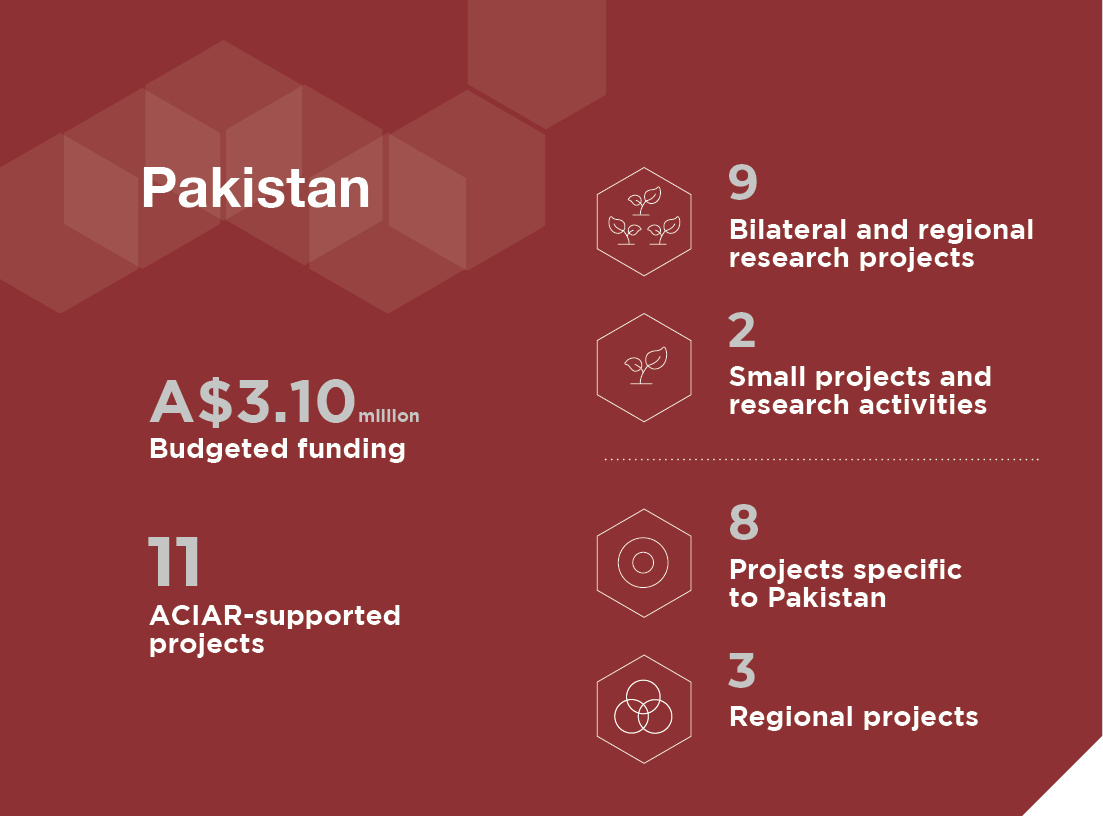Agriculture is the largest sector of Pakistan’s economy. It contributes about 24% of GDP and is the largest source of foreign exchange earnings.
The sector also accounts for half of the employed labour force, of which two-thirds are women. Pakistan’s strong agricultural research system has been driving innovation and improvements in this sector.
The COVID-19 pandemic put significant pressure on the economy of Pakistan. Drastic measures to control the pandemic significantly reduced economic activity (including activity in agrifood systems), with consequent impacts on livelihoods, food security and nutrition. The heavy rainfall and floods of 2022 added to the problems of the sector. Approximately 57% of the cropland in the agricultural area in Sindh province, a focal geography of ACIAR, was impacted by flooding.
The decline of the Pakistan currency against the US dollar and other major currencies has stakeholders in the agriculture sector concerned, as they rely on imported inputs like seeds, fertiliser, pesticides and machinery. In turn, production costs for farmers have increased, impacting rural livelihoods and jeopardising national food security.
Before the pandemic, about 25% of the population lived below the national poverty line. Food insecurity is typically high, with 20–30% of the population (40 to 62 million people) experiencing some form of food insecurity and chronic vulnerability through natural hazards and shocks, including the ongoing pandemic. It is predicted that due to the catastrophic floods and exacerbated economic and financial challenges, more people will drop below the poverty line in the coming year.
Pakistan recognises that cost-effective availability of energy, water and food is essential to ensure sustainable economic growth and development. Sizeable national and provincial programs are being funded to revolutionise the agriculture and livestock sectors. These programs are aimed at increasing agricultural productivity, value addition to agricultural products, reducing dependence on imports, supporting and stimulating agriculture-based industries, and improving the livelihoods and wellbeing of farming communities.
Pakistan is ranked third in the world of countries facing water shortages. It is estimated that Pakistan will become the most water-stressed country in South Asia by 2040, with absolute water scarcity by 2025. There are many reasons for the country’s water scarcity. The most important are climate change, urbanisation and high dependence on groundwater for agriculture and other operations.
Country priorities
Due to reduced investments in agriculture, the sector is experiencing stagnant growth, and increasing inflation, input prices and electricity tariffs have also played their part. To boost growth in agriculture, job creation and encourage the country’s exports, the Pakistan Government recognises that synchronising programs, reforming of institutions and encouraging public–private partnership is important. The present policy and resourcing focus is on:
- developing adaptation and mitigation strategies for climate change and preparing farmers for the future scenarios
- ensuring food security and job creation through technology-based interventions with emphasis on small and medium-size farmers and landless tenants
- developing enabling policies to ensure institutional support for private sector investment in agricultural business of high-value crops, value addition and supply chain infrastructure
- developing reforms for moving towards market economy and involving private sector in the market-led approach to diversification of agriculture
- implementing international food standards to enhance exports
- creating traceability systems and improving marketing infrastructure and policies based on the public–private partnerships.
Australia has a 70-year development assistance relationship with Pakistan, which has contributed to Pakistan’s long-term economic prosperity, stability and resilience. Australia is seen as a country with deep and relevant expertise in agriculture, livestock production and water management.
ACIAR is regarded as a key international partner supporting agricultural research in Pakistan. Our work is high profile and regularly gains the attention of policymakers at national and provincial levels.
Australia and Pakistan are working in partnership, where Pakistan makes substantial in-kind contributions to research programs. ACIAR aims to develop a partnering arrangement with the Pakistan Agricultural Research Council Pakistan. Our other partners in Pakistan include the National Agricultural Research System, universities and the agribusiness sector along with other international agencies working in the space. ACIAR also makes targeted technical interventions.
The ongoing focus of our research collaboration is:
- empowering women to enhance farm incomes
- water management, particularly horizontal expansion, salinity management, water harvesting, and low-cost/high-efficiency irrigation systems
- crop improvement, particularly productivity enhancement and access to novel breeding techniques
- horticulture, including fresh produce and nursery certification systems
- agribusiness development, including background research in value-adding, product development, branding and traceability systems for growing private sector needs, which the national system cannot provide
- models for rural transformation.
2023–24 research program
The research program addresses our high-level objectives, as outlined in the ACIAR 10-Year Strategy 2018–2027, as well as specific issues and opportunities identified by ACIAR and our partner organisations.
The following table lists ACIAR-supported projects active in Pakistan during 2023–24.
Current and proposed projects in Pakistan, 2023–24

